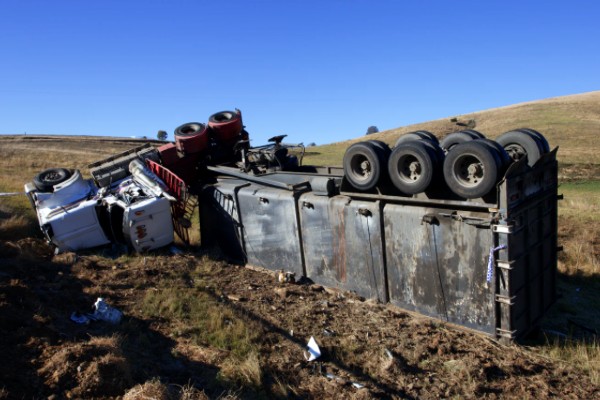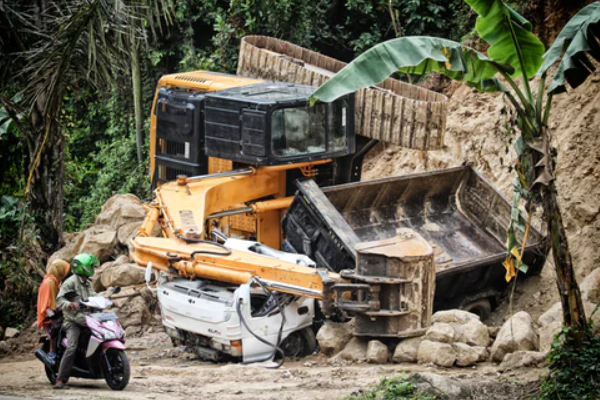 It’s a little-known fact that trucks are without doubt the most dangerous vehicles on the road. The high center of gravity and wide turning radius makes it hard for truck drivers to control their vehicles in emergency situations, which can lead to devastating accidents. In this article, we’ll explain the reasons why they are so lethal and discuss how you can protect yourself from them.
It’s a little-known fact that trucks are without doubt the most dangerous vehicles on the road. The high center of gravity and wide turning radius makes it hard for truck drivers to control their vehicles in emergency situations, which can lead to devastating accidents. In this article, we’ll explain the reasons why they are so lethal and discuss how you can protect yourself from them.
What Is A Truck?
A truck is a vehicle that is used to transport goods and materials from one place to another. They vary in size, shape, weight capacity, and what they are designed for. Trucks can weigh up to 80 times more than cars or even 18 tons.
Semi-trucks have two or three trailers that can be attached to them, weighing up to 80,000 pounds. They are what you see being used for shipping across the country. Dump trucks carry gravel and other materials like dirt onto construction sites or other destinations. Tractor-trailers transport goods from one location to another (which are stored in a special area at the back). Pickup trucks can be used for many different reasons including carrying cargo, hauling livestock, or transporting goods to and from the local market. Flatbeds are what mechanics use when they need to transport a car that is too large for their personal vehicles.
Why Are They So Dangerous?
Truck accidents account for nearly 15% of fatalities each year according to federal statistics, which should cause all drivers to be concerned. Here are some of the key reasons why they are so lethal:
Cargo Issues
This makes it top heavy and therefore easy to topple over if it’s not properly balanced out throughout the entire truck bed. El Paso is a city located in the far western part of Texas in the United States of America. It’s possible to contact an improperly loaded truck accident lawyer in El Paso by submitting an online form, using live chat, or making a phone call. This can connect accident victims to professionals who can consult with reconstructionists and other experts in order to pursue full and fair compensation.
Their Design
They take a long time to stop; their brakes require longer braking distances than most other vehicles. They can take up a lot of room on the roadway. Due to their size, they might not be able to go around corners as quickly or at all. This can cause problems when trying to change lanes and turn onto side roads etc., especially if there are cars present that have been stopped by an unexpected red traffic light or stop sign. They struggle to swerve into another lane at short notice. Technical issues such as brake failure occasionally occur.
Human Error
Truck drivers can be easily distracted while driving due to their job being so monotonous. Poor parking (or lack of!) creates obstructions and causes accidents. Bad driver behavior sometimes occurs, e.g. breaking the road rules, road rage, bullying. There’s also driver fatigue due to their shifts being so long, plus high staff turnover and poor training.

How To Stay Safe
We can’t do much about the size of trucks, but what we can work on is how to stay safe around them, especially if you live near highways or roads that are frequented by 18-wheelers.
The following tips may be of help:
Think Of Visibility And Distance
Make sure your car’s headlights are up to date (with no burnt-out bulbs) so drivers behind you can see you more easily. Even though some rigs have bright lights on top nowadays, many still rely upon old-fashioned halogen bulbs that will not light up the road as well. Don’t drive too closely to the truck in front of you, especially if it’s slowing down. Give them plenty of room and stay back several car lengths at least.
Trucks cannot see as well around their vehicle as smaller vehicles, although they are equipped with extra mirrors on both sides. As a result, you should never assume that the other driver can see you, and don’t try and pass a big rig on the right side while it’s making its turn. Instead, stay back until they are finished turning.
Be Careful In Lanes
Always pay attention when changing lanes near a large 18-wheeler and never cut one-off or try to force them into another lane. If you need to, let them have the right of way. Trucks often make wide turns due to their size, which means that you will need to allow them extra room when passing. Never try and share a lane with a truck or go-between lanes when driving near them. Never assume a truck is going to stay in its lane – it may drift over from time to time without the driver realizing.
Drive Responsibly
Avoid distractions when driving near trucks, such as talking on your cell phone or fiddling with the radio. Stay aware of other cars around you, especially the ones that are much larger than your own. Trucks have a lot of blind spots and they might not be able to stop in time if you do something unexpected. The road is not meant for pedestrians. If there isn’t a designated walking path it is unsafe to walk on the street near a lot of traffic (including large vehicles such as trucks or buses). Stay in your car when you are at a truck stop. Don’t cut through an area where trucks park to get somewhere else because that’s both dangerous and illegal.
As you can see, trucks are a force to be reckoned with and we’ve now discussed several practical ways you can avoid being in an accident with one. Whilst you can’t protect yourself from other peoples’ errors, you can stay alert and take every possible precaution to avoid having an accident. Should the unthinkable occur and you suffer at the hands of a negligent truck driver, a specialist lawyer will be there to help you through the legal process.
Become a Harlem Insider!
By submitting this form, you are consenting to receive marketing emails from: Harlem World Magazine, 2521 1/2 west 42nd street, Los Angeles, CA, 90008, https://www.harlemworldmagazine.com. You can revoke your consent to receive emails at any time by using the SafeUnsubscribe® link, found at the bottom of every email. Emails are serviced by Constant Contact








